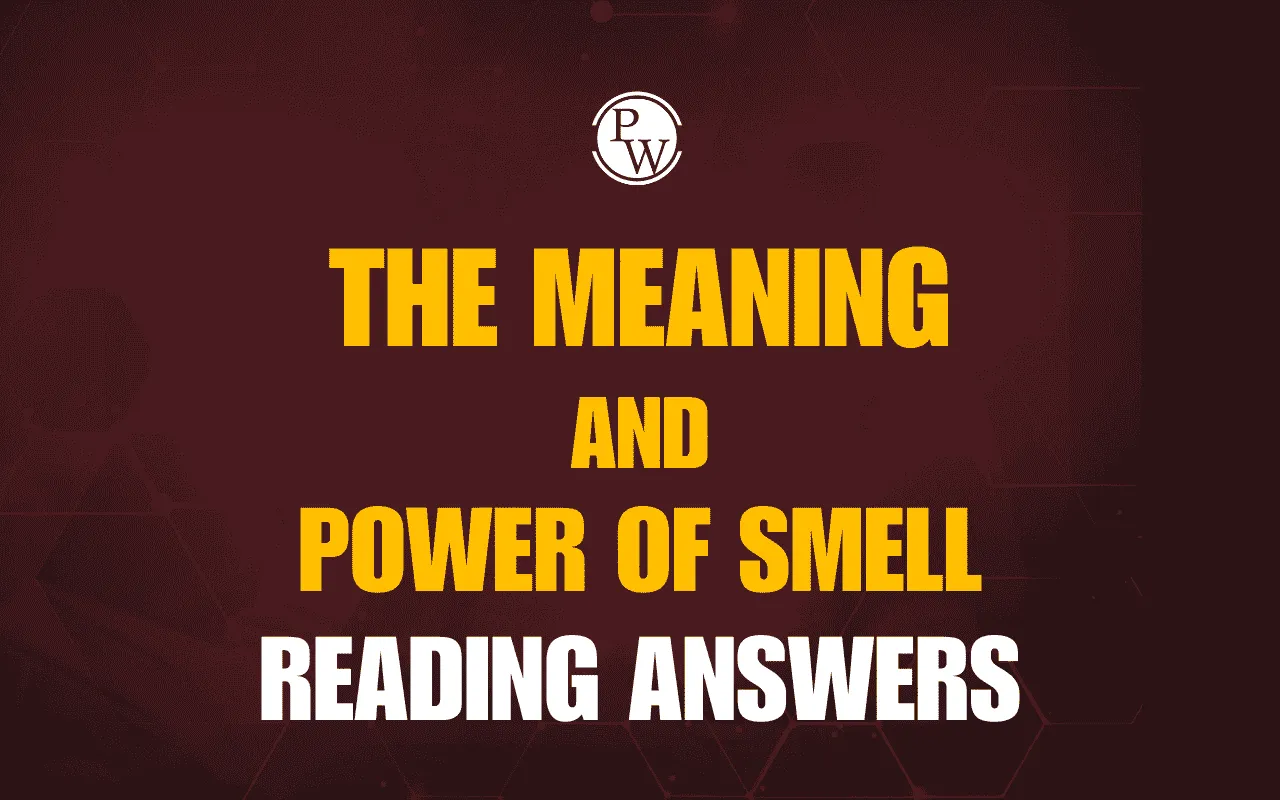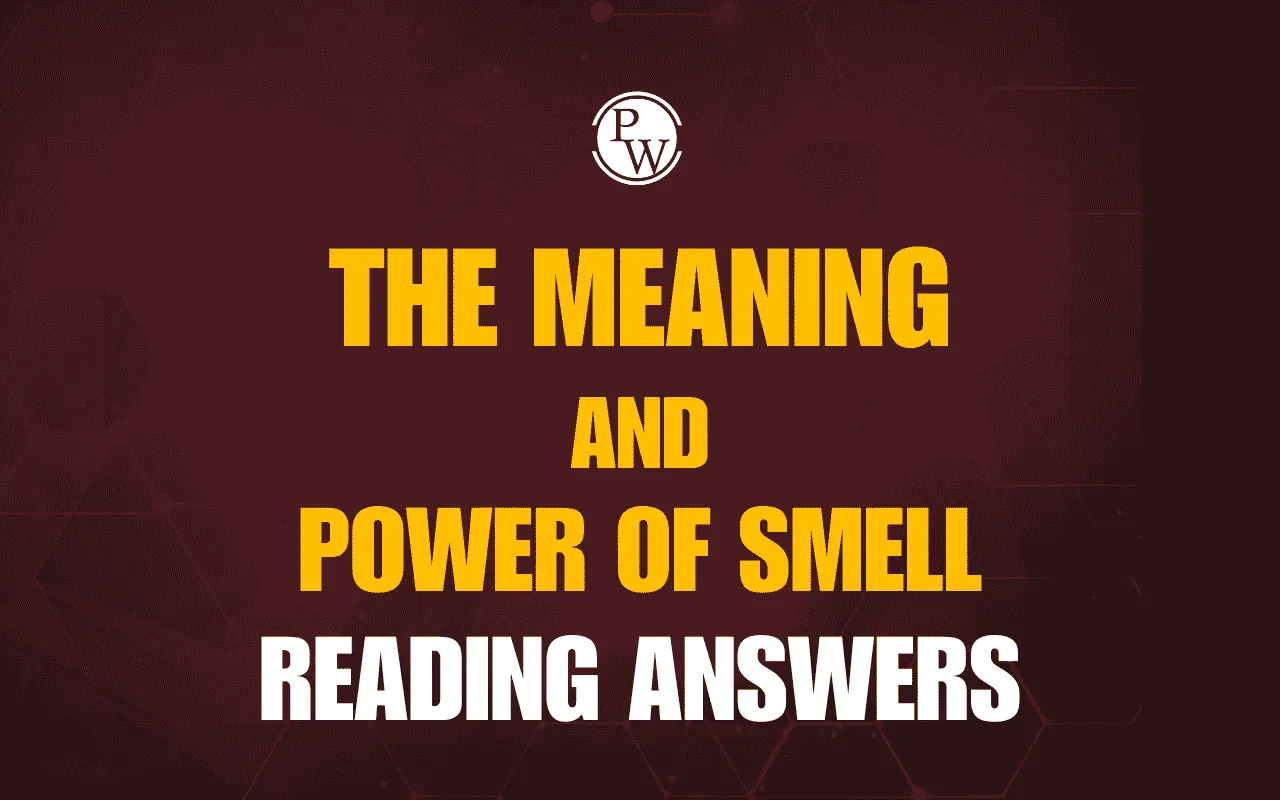
The Meaning and Power of Smell Reading Answers explores the emotional, social, and cultural significance of smell. This passage is a key part of IELTS Reading Topics and helps learners practice IELTS Reading multiple choice questions and IELTS Reading Sentence Completion Questions.
Understanding it improves skills in IELTS Reading Question Types, IELTS Reading Test Format, and overall IELTS Reading structure. By working on these questions, students can learn how to handle Multiple Choice Questions in IELTS Reading and how to improve IELTS Reading Score. Regular practice with The Meaning and Power of Smell Reading Answers aids in achieving a higher IELTS Reading Band Score.
IELTS The Meaning And Power Of Smell Reading Answers With Passage
The Meaning And Power Of Smell Reading Answers with passage helps learners explore the role of smell in human emotion, culture, and society. Practicing this passage improves skills in IELTS Reading multiple choice questions, IELTS Reading Sentence Completion Questions, and overall IELTS READING structure for a higher IELTS Reading Band Score.
The Meaning And Power Of Smell Reading Passge
Paragraph- A: A survey conducted by Anthony Synott at Montreal’s Concordia University asked participants to comment on how important smell was to them in their lives. It became apparent that smell can evoke strong emotional responses. A scent associated with a good experience can bring a rush of joy, while a foul odour or one associated with a bad memory may make us grimace with disgust. Respondents to the survey noted that many of their olfactory likes and dislikes were based on emotional associations. Such associations can be powerful enough so that odours that we would generally label unpleasant become agreeable, and those that we would generally consider fragrant become disagreeable for particular individuals. The perception of smell, therefore, consists not only of the sensation of the odours themselves but of the experiences and emotions associated with them.
Paragraph- B: Odours are also essential cues in social bonding. One respondent to the survey believed that there is no true emotional bonding without touching and smelling a loved one. In fact, infants recognise the odours of their mothers soon after birth and adults can often identify their children or spouses by scent. In one well-known test, women and men were able to distinguish by smell alone clothing worn by their marriage partners from similar clothing worn by other people. Most of the subjects would probably never have given much thought to odour as a cue for identifying family members before being involved in the test, but as the experiment revealed, even when not consciously considered, smells register.
Paragraph- C: In spite of its importance to our emotional and sensory lives, smell is probably the most undervalued sense in many cultures. The reason often given for the low regard in which smell is held is that, in comparison with its importance among animals, the human sense of smell is feeble and undeveloped. While it is true that the olfactory powers of humans are nothing like as fine as those possessed by certain animals, they are still remarkably acute. Our noses are able to recognize thousands of smells and to perceive odors which are present only in extremely small quantities.
Paragraph- D: Smell, however, is a highly elusive phenomenon. Odours, unlike colours, for instance, cannot be named in many languages because the specific vocabulary simply doesn’t exist. ‘It smells like . . . ,’ we have to say when describing an odour, struggling to express our olfactory experience. Nor can odours be recorded: there is no effective way to either capture or store them over time. In the realm of olfaction, we must make do with descriptions and recollections. This has implications for olfactory research.
Paragraph- E: Most of the research on smell undertaken to date has been of a physical scientific nature. Significant advances have been made in the understanding of the biological and chemical nature of olfaction, but many fundamental questions have yet to be answered. Researchers have still to decide whether smell is one sense or two - one responding to odours proper and the other registering odourless chemicals in the air. Other unanswered questions are whether the nose is the only part of the body affected by odours, and how smells can be measured objectively given the nonphysical components. Questions like these mean that interest in the psychology of smell is inevitably set to play an increasingly important role for researchers.
Paragraph- F: However, smell is not simply a biological and psychological phenomenon. Smell is cultural, hence it is a social and historical phenomenon. Odors are invested with cultural values: smells that are considered to be offensive in some cultures may be perfectly acceptable in others. Therefore, our sense of smell is a means of, and model for, interacting with the world. Different smells can provide us with intimate and emotionally charged experiences and the value that we attach to these experiences is interiorized by the members of society in a deeply personal way. Importantly, our commonly held feelings about smells can help distinguish us from other cultures. The study of the cultural history of smell is, therefore, in a very real sense, an investigation into the essence of human culture.
The Meaning And Power Of Smell Reading Sample Questions
Sample questions on The Meaning And Power Of Smell Reading Answers help learners practice IELTS Reading Question Types and understand how to handle Multiple Choice Questions in IELTS Reading. This aids in mastering the IELTS Reading Test Format and improving accuracy in IELTS Reading multiple-choice questions.
| Sample Question on IELTS The Meaning And Power Of Smell Reading Answers | ||
| Question Type | Question | Options / Instructions |
| Multiple Choice | Q1. What did Anthony Synott’s survey at Concordia University investigate? | A. Visual perception B. Sense of smell C. Taste preferences D. Touch sensitivity |
| Multiple Choice | Q2. How do smells influence emotions according to the survey? | A. Only positive emotions B. Only negative emotions C. Both positive and negative emotions D. No effect |
| True / False / Not Given | Q3. Infants cannot recognize their mothers by scent. | True / False / Not Given |
| Matching Information | Q4. Match the cultural aspect of smell with its description: | a. Offensive in some cultures → Accepted in others b. Fragrant smells → Disliked in some cultures |
| Sentence Completion | Q5. Human noses can recognize thousands of smells and perceive odors in _______. | Fill in the blank from passage. |
| True / False / Not Given | Q6. Smell is only a biological and psychological phenomenon, not cultural. | True / False / Not Given |
| Multiple Choice | Q7. Why is smell considered elusive? | A. It cannot be seen B. It cannot be named or stored C. It has no effect on emotions D. It is very common |
| Sentence Completion | Q8. Many fundamental questions about smell remain, including whether it is _______. | Fill in the blank from passage. |
| Matching Headings | Q9. Choose the correct heading: “Odors are invested with cultural values and differ between societies.” | A. Biological Nature of Smell B. Cultural Significance of Smell C. Survey Findings D. Emotional Associations |
| Short Answer Question | Q10. How do smells help humans in social bonding? | Answer in NO MORE THAN THREE WORDS. |
The Meaning And Power Of Smell Reading Answers
IELTS The Meaning And Power Of Smell Reading Answers is essential for practicing IELTS Reading Topics. Students can improve comprehension, IELTS Reading Sentence Completion Questions, and learn how to improve their IELTS Reading Score through repeated practice of these questions and passage-based exercises.
| IELTS The Meaning And Power Of Smell Reading Answers | ||
| Question Type | Question | Answer |
| Multiple Choice | Q1. What did Anthony Synott’s survey at Concordia University investigate? | B. Sense of smell |
| Multiple Choice | Q2. How do smells influence emotions according to the survey? | C. Both positive and negative emotions |
| True / False / Not Given | Q3. Infants cannot recognize their mothers by scent. | False |
| Matching Information | Q4. Match the cultural aspect of smell with its description: | a. Offensive in some cultures → Accepted in others b. Fragrant smells → Disliked in some cultures |
| Sentence Completion | Q5. Human noses can recognize thousands of smells and perceive odors in _______. | extremely small quantities |
| True / False / Not Given | Q6. Smell is only a biological and psychological phenomenon, not cultural. | False |
| Multiple Choice | Q7. Why is smell considered elusive? | B. It cannot be named or stored |
| Sentence Completion | Q8. Many fundamental questions about smell remain, including whether it is _______. | one sense or two |
| Matching Headings | Q9. Choose the correct heading: “Odors are invested with cultural values and differ between societies.” | B. Cultural Significance of Smell |
| Short Answer Question | Q10. How do smells help humans in social bonding? | Identify family members |
Guidance to PW IELTS Prep
IELTS Online Courses is a great initiative Physics Wallah took to help IELTS aspirants better prepare for the exam. Follow our below pages to learn more about the IELTS exam.| IELTS Reading Band Score | IELTS Listening Band Score |
| IELTS Speaking Band Score | IELTS Writing Band Score |
IELTS The Meaning And Power Of Smell Reading Answers FAQs
What did the survey at Concordia University reveal about smell?
Who proposed the idea of uHow do smells influence social bonding?sing kites for building pyramids?
Why is smell considered undervalued in many cultures?
Why is smell described as elusive?
How is smell culturally significant?











